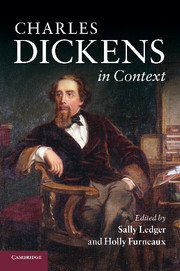Book contents
- Frontmatter
- Contents
- List of illustrations
- Notes on contributors
- Preface
- Notes on references
- PART I LIFE AND AFTERLIFE
- PART II SOCIAL AND CULTURAL CONTEXTS
- 12 Popular culture
- 13 The rise of celebrity culture
- 14 The newspaper and periodical market
- 15 Authorship and the professional writer
- 16 The theatre
- 17 Melodrama
- 18 The Bildungsroman
- 19 Visual culture
- 20 The historical novel
- 21 The illustrated novel
- 22 Christmas
- 23 Childhood
- 24 Work
- 25 Europe
- 26 The Victorians and America
- 27 Educating the Victorians
- 28 London
- 29 Politics
- 30 Political economy
- 31 The aristocracy
- 32 The middle classes
- 33 Urban migration and mobility
- 34 Financial markets and the banking system
- 35 Empires and colonies
- 36 Race
- 37 Crime
- 38 The law
- 39 Religion
- 40 Science
- 41 Transport
- 42 Illness, disease and social hygiene
- 43 Domesticity
- 44 Sexuality
- 45 Gender identities
- Further reading
- Index
40 - Science
Published online by Cambridge University Press: 05 August 2012
- Frontmatter
- Contents
- List of illustrations
- Notes on contributors
- Preface
- Notes on references
- PART I LIFE AND AFTERLIFE
- PART II SOCIAL AND CULTURAL CONTEXTS
- 12 Popular culture
- 13 The rise of celebrity culture
- 14 The newspaper and periodical market
- 15 Authorship and the professional writer
- 16 The theatre
- 17 Melodrama
- 18 The Bildungsroman
- 19 Visual culture
- 20 The historical novel
- 21 The illustrated novel
- 22 Christmas
- 23 Childhood
- 24 Work
- 25 Europe
- 26 The Victorians and America
- 27 Educating the Victorians
- 28 London
- 29 Politics
- 30 Political economy
- 31 The aristocracy
- 32 The middle classes
- 33 Urban migration and mobility
- 34 Financial markets and the banking system
- 35 Empires and colonies
- 36 Race
- 37 Crime
- 38 The law
- 39 Religion
- 40 Science
- 41 Transport
- 42 Illness, disease and social hygiene
- 43 Domesticity
- 44 Sexuality
- 45 Gender identities
- Further reading
- Index
Summary
The term ‘scientist’ is a Victorian one, coined by William Whewell in 1833. From there it is easy to imagine Victorian science as advancing steadily, shedding spiritualism, natural theology, mesmerism and phrenology towards what we might recognise as science today. Yet, as with many such convenient historical myths, we find nothing of the sort, with some scientists at the end of the century denouncing state funding for research, defending the study of supernatural phenomena and, in the pages of the late nineteenth-century popular science magazine Science-Gossip, having a lively discussion as to why the term ‘scientist’ should be abandoned as a barbarism. Although those who practised science might have claimed their results captured timeless truths about the natural world, what were considered truths and the methods with which they were derived and disseminated were drawn from the changing world around them. Equipment, methods, bodies of knowledge, research programmes, networks of expertise and mechanisms for the communication of results all rooted the production of objective scientific knowledge in historically contingent social practices. Not only does science have a history, but for those Victorians practising science there were a variety of subjects to study and ways in which to study them.
- Type
- Chapter
- Information
- Charles Dickens in Context , pp. 326 - 333Publisher: Cambridge University PressPrint publication year: 2011



